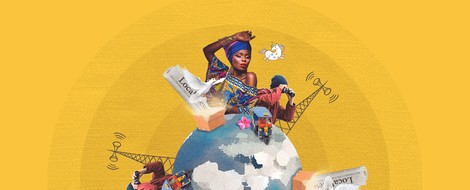Your podcast discovery platform
Curious minds select the most fascinating podcasts from around the world. Discover hand-piqd audio recommendations on your favorite topics.

piqer for: Global finds Health and Sanity Doing Good
Bangalore-based Rashmi Vasudeva's journalism has appeared in many Indian and international publications over the past decade. A features writer with over nine years of experience heading a health and fitness supplement in a mainstream Indian newspaper, her niche areas include health, wellness, fitness, food, nutrition and Indian classical Arts.
Her articles have appeared in various publications including Mint-Wall Street Journal, The Hindu, Deccan Herald (mainstream South Indian newspaper), Smart Life (Health magazine from the Malayala Manorama Group of publications), YourStory (India's media technology platform for entrepreneurs), Avantika (a noir arts and theatre magazine), ZDF (a German public broadcasting company) and others.
In 2006, she was awarded the British Print-Chevening scholarship to pursue a short-term course in new-age journalism at the University of Westminster, U.K. With a double Masters in Globalisation and Media Studies from Aarhus Universitet (Denmark), University of Amsterdam and Swansea University in Wales, U.K., she has also dabbled in academics, travel writing and socio-cultural studies. Mother to a frisky toddler, she hums 'wheels on the bus' while working and keeps a beady eye on the aforementioned toddler's antics.
Why AI Scientists Might Want To Play With Babies (And Learn From Them)
Henry Kissinger might be worried that human society is unprepared philosophically and intellectually for Artificial Intelligence but that isn’t stopping AI's march. Kissinger quotes the now-famous example of AI program AlphaGo mastering the game Go by playing against itself and eventually defeating its world champion.
But this article argues (taking the same example) that AI is still naive; and though a system like AlphaGo can master a game, it is not “extracting lessons” from it. In other words, if AlphaGo has to play the game on a 21-by-21 board instead of a 19-by-19, it has to relearn from scratch.
Which is not how babies think.
Babies have an innate adaptability, common sense and abstract intelligence that have proved elusive for AI algorithms. Increasingly, cognitive researchers like Gary Marcus (featured) are wondering if AI scientists would do well to pick up some cues from babies. Marcus says computer scientists, high on the success of machine learning, have a ‘blind spot’ with regard to decades of cognitive research on humans' innate abilities for abstract thinking and common sense. He believes it is time AI scientists include these instincts in future programs.
Arguments for a more multi-disciplinary approach are growing because of the inexplicable blunders that AI sometimes makes. The author gives the instance of how image recognition programs that distinguish dog breeds sometimes mistake a Chihuahua for a muffin! Or how AI plays Space Invaders with great skill but falters badly when all but one aliens are removed. For a child, recognition is more nuanced; and hence a Chihuahua with three legs will still be recognized as a dog by a three-year-old.
Work is on in this direction. In February, MIT launched Intelligence Quest, a new research initiative that, among others, aims to discover what babies learn and when, to apply this knowledge to machines, while the Allen Institute in Seattle is testing common sense in AI.
Looks like the child is the father of AI as well.
